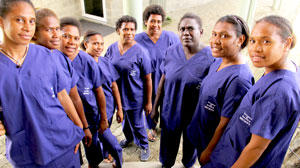Every year, 350,000 women around the globe do not survive pregnancy or childbirth. To add to this tragedy, up to two million newborns die within 24 hours of taking their first breath. The overwhelming majority of these deaths occur in low-income countries and, according to the United Nations Population Fund, most are preventable.
International Day of the Midwife on 5 May is a reminder that much can be done to turn this around. AusAID's work in Papua New Guinea is an example of what we are doing in our region to assist.
PNG has the highest maternal mortality in the Pacific–a woman in PNG is 80 times more likely to die in pregnancy or childbirth than a woman in Australia. A major barrier to a safe birth in PNG is the lack of midwives–PNG has just 152 practicing midwives for approximately 220,000 births a year.
To address this problem, Australia will provide scholarships to train 500 Papua New Guinean nurses in midwifery. These midwives will help achieve the target of increasing the number of births supervised by a skilled birth attendant by 8000 a year by 2015. Australia is also refurbishing the four current PNG midwifery schools and building a fifth in East New Britain Province, which will be completed by December 2012.
Eight experienced midwifery clinical facilitators at all four of PNG's midwifery schools are also being supported to improve the quality of education for midwives. This support has directly contributed to the graduation of 49 midwifery students in 2011, compared to 2010 where there was no intake.
One student said: "Before the training, I could be in the same room as a mother experiencing a life-threatening birth and I wouldn't know what to do. I had no supervision and the mother would die in front of me. Now I have learnt to save mother and child, and I can pass my knowledge and skills onto others."
In addition to training health staff, Australia is distributing medical equipment and drugs. Other activities include:
- funding a pilot-training scheme to improving the skill of Community Health Workers in rural areas in pregnancy assessment and emergency obstetric care
- providing two obstetrician-gynaecologists at two major provincial hospitals to provide clinical care and to teach midwives, nurses and doctors
- distributing essential drugs, including those for treating complications in pregnancy and labour, to all functioning health facilities in PNG
- purchasing emergency obstetric equipment for all district hospitals and health centres in PNG, which will be distributed in 2012
- funding a comprehensive maternal mortality audit – collecting and analysing data on the circumstances around maternal deaths is an essential step towards progress in reducing maternal mortality
- refurbishing rural health facilities, with water supply and sanitation facilities, and associated staff housing, which is a critical factor in attracting and retaining staff in rural areas of PNG.

